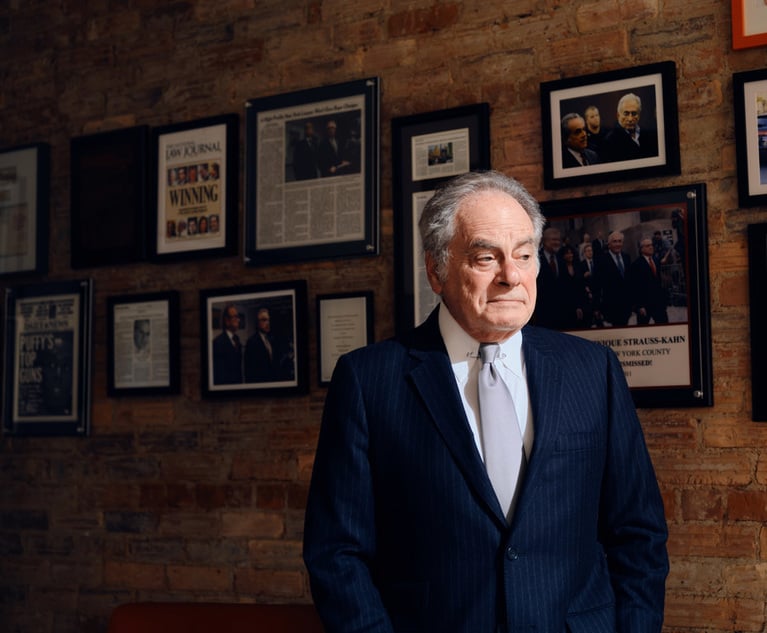Litigators of the Week: A Gig Economy Bellwether Battle
Gibson Dunn & Crutcher partners Michele Maryott and Theane Evangelis scored a win for GrubHub in a bellwether case that could have a lasting impact on how gig-economy workers are classified.
February 15, 2018 at 08:22 PM
5 minute read
 Michele Maryott, left, and Theane Evangelis, right, of Gibson Dunn & Crutcher.
Michele Maryott, left, and Theane Evangelis, right, of Gibson Dunn & Crutcher.
Gibson Dunn & Crutcher partners Michele Maryott and Theane Evangelis scored a win in a bellwether case that could have a lasting impact on how gig-economy workers are classified.
But Maryott and Evangelis said that for them, despite its importance to the labor and employment legal community at large, the case was about one thing: getting the best result for their client, food-delivery company GrubHub.
“Every trial is monumentally important to our clients,” Maryott said. “So I just focused on what do we need to do to put on the best case we possibly can for GrubHub … the courtroom was packed almost every day, but we were just there to put on our case and convince the judge that we were right.”
Former GrubHub driver Raef Lawson sued the company, alleging GrubHub misclassified him as an independent contractor instead of an employee entitled to minimum wage and other benefits. While other gig-economy giants like Uber have faced similar challenges, the GrubHub case is the first to reach a conclusion in federal court.
The case was the perfect fit for Maryott and Evangelis, both employment and class action law veterans who actually met in 2009 when they were working on Wal-Mart Stores, Inc. v. Dukes, which the Supreme Court decided in 2011.
When it came to GrubHub, Evangelis said, the key was looking ahead and setting the stage. The case began as a class action in state court in California in 2015, and was soon removed to federal court in the Northern District of California. The Gibson team then filed a preemptive motion asking the judge to deny class certification.
The judge granted it a little more than a month later, agreeing that Lawson, who had opted out of GrubHub's arbitration agreement with a class action waiver, could not represent a class of workers the majority of whom had signed the agreements.
“I think that really changed the playing field,” Evangelis said. “The case went from being a class action to being a [Private Attorney General Act] case. In many ways, it really became about Mr. Lawson and his attempt to proceed on behalf of the state.”
Next, the lawyers focused their efforts on Lawson's deposition. The key, Maryott explained, was making sure that everything he said could be brought out again at trial. The worker, they were sure, had gamed the GrubHub system so he could remain inactive for much of his shift. The company also exerted what they considered to be very little control over him, not dictating what he wore or how he made deliveries, and allowing him to work for other delivery services while also working for GrubHub.
“We wanted to make sure that we nailed him down on key points during the deposition, so that if they case did go to trial–and it was highly likely that would happen–it would be very hard for him to change his story,” Maryott explained.
The tactic worked, and Maryott was able to use the deposition throughout a six-day trial to coax Lawson into telling the judge exactly how he approached his work for GrubHub.
Maryott said that throughout the trial, she would pull out the deposition and read it back to Lawson, directly contradicting what he said on the stand or filling in a fact that he claimed he no longer remembered.
'In many ways, he was our best witness,” Evangelis said. “His experience showed that no one was controlling him, watching him, he had no boss, there was no one monitoring him in any way. He had complete independence and flexibility, and in his case, it allowed him to game the system, but it really got to the heart of the matter.”
Still, it wasn't over until it was over. As U.S. Magistrate Judge Jacqueline Corley closed the trial, it appeared she might rule against GrubHub. She noted that Lawson's contract with the company allowed him to be terminated at will, an important factor in determining an employment relationship under California law.
Evangelis and Maryott said the judge's focus on the contract issue was actually encouraging.
“As I left, it felt like that had been a challenging argument for sure, but I think that just speaks to the rigor that [Corley] put into the process,” Maryott said.
Corley's opinion in the case reflected that rigor too. In ruling for GrubHub Feb. 8, the judge outlined every factor in her decision that the company did not exert enough control over Lawson for him to be considered an employee.
Lawson's lawyer, Shannon Liss-Riordan, said last week she plans to appeal that ruling. When she does, Maryott and Evangelis said they'll be right back at it too.
This content has been archived. It is available through our partners, LexisNexis® and Bloomberg Law.
To view this content, please continue to their sites.
Not a Lexis Subscriber?
Subscribe Now
Not a Bloomberg Law Subscriber?
Subscribe Now
NOT FOR REPRINT
© 2025 ALM Global, LLC, All Rights Reserved. Request academic re-use from www.copyright.com. All other uses, submit a request to [email protected]. For more information visit Asset & Logo Licensing.
You Might Like
View All
Amid the Tragedy of the L.A. Fires, a Lesson on the Value of Good Neighbors

Why the Founders of IP Boutique Fisch Sigler Are Stepping Away From the Law and Starting an AI Venture

Like a Life Raft: Ben Brafman Reflects on Nearly 50 Years as a Defense Attorney

Trying a Case for Abu Ghraib Detainees Two Decades After Abuse
Trending Stories
Who Got The Work
J. Brugh Lower of Gibbons has entered an appearance for industrial equipment supplier Devco Corporation in a pending trademark infringement lawsuit. The suit, accusing the defendant of selling knock-off Graco products, was filed Dec. 18 in New Jersey District Court by Rivkin Radler on behalf of Graco Inc. and Graco Minnesota. The case, assigned to U.S. District Judge Zahid N. Quraishi, is 3:24-cv-11294, Graco Inc. et al v. Devco Corporation.
Who Got The Work
Rebecca Maller-Stein and Kent A. Yalowitz of Arnold & Porter Kaye Scholer have entered their appearances for Hanaco Venture Capital and its executives, Lior Prosor and David Frankel, in a pending securities lawsuit. The action, filed on Dec. 24 in New York Southern District Court by Zell, Aron & Co. on behalf of Goldeneye Advisors, accuses the defendants of negligently and fraudulently managing the plaintiff's $1 million investment. The case, assigned to U.S. District Judge Vernon S. Broderick, is 1:24-cv-09918, Goldeneye Advisors, LLC v. Hanaco Venture Capital, Ltd. et al.
Who Got The Work
Attorneys from A&O Shearman has stepped in as defense counsel for Toronto-Dominion Bank and other defendants in a pending securities class action. The suit, filed Dec. 11 in New York Southern District Court by Bleichmar Fonti & Auld, accuses the defendants of concealing the bank's 'pervasive' deficiencies in regards to its compliance with the Bank Secrecy Act and the quality of its anti-money laundering controls. The case, assigned to U.S. District Judge Arun Subramanian, is 1:24-cv-09445, Gonzalez v. The Toronto-Dominion Bank et al.
Who Got The Work
Crown Castle International, a Pennsylvania company providing shared communications infrastructure, has turned to Luke D. Wolf of Gordon Rees Scully Mansukhani to fend off a pending breach-of-contract lawsuit. The court action, filed Nov. 25 in Michigan Eastern District Court by Hooper Hathaway PC on behalf of The Town Residences LLC, accuses Crown Castle of failing to transfer approximately $30,000 in utility payments from T-Mobile in breach of a roof-top lease and assignment agreement. The case, assigned to U.S. District Judge Susan K. Declercq, is 2:24-cv-13131, The Town Residences LLC v. T-Mobile US, Inc. et al.
Who Got The Work
Wilfred P. Coronato and Daniel M. Schwartz of McCarter & English have stepped in as defense counsel to Electrolux Home Products Inc. in a pending product liability lawsuit. The court action, filed Nov. 26 in New York Eastern District Court by Poulos Lopiccolo PC and Nagel Rice LLP on behalf of David Stern, alleges that the defendant's refrigerators’ drawers and shelving repeatedly break and fall apart within months after purchase. The case, assigned to U.S. District Judge Joan M. Azrack, is 2:24-cv-08204, Stern v. Electrolux Home Products, Inc.
Featured Firms
Law Offices of Gary Martin Hays & Associates, P.C.
(470) 294-1674
Law Offices of Mark E. Salomone
(857) 444-6468
Smith & Hassler
(713) 739-1250






